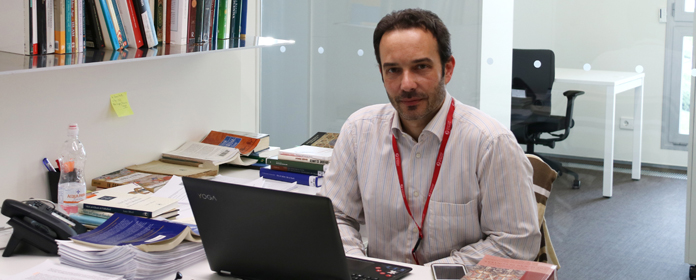Analyze Islamic history to understand what the Qur'an says about violence against non-Muslims.
framework Demichelis, researcher Marie Curie of the ICS, has carried out during the 2017-2018 academic year two stays in prestigious centers in France and Germany.

PHOTO: Isabel Solana
One cannot understand what the Qur'an says about violence against non-Muslims without analyzing Islamic history. With the goal of making a rigorous research , which helps to interpret the verses in the light of this historical context, the researcher framework Demichelis, from the project 'Religion and Civil Society' of the Institute for Culture and Society (ICS), has made two stays of research in prestigious centers in Germany and France.
Demichelis, who joined the ICS in June 2017 thanks to a scholarship Marie Curie from the European Commission, focuses on two historical moments: the early centuries of Islam (7th-10th centuries) and the contemporary era.
To develop this research and understand new points of view, the researcher of the ICS conducted a research stay at the high school of programs of study Orientals at the University of Bamberg (Germany). From October to December 2017, he worked with Professor Patrick Franke, a specialist in early Islamic history and Quran reading. Franke offered him advice and a methodology to develop the analysis of Quranic texts.
On the other hand, researcher of the ICS tries to understand and interpret how this vision of violence in the Koran has become so important in today's society. In this case, he has been able to see first hand the status of Muslims in Europe thanks to a second stay at the Catholic University of Lyon (France), where he worked with an interreligious group .
In Lyon, he analyzed how this narrative of violence affects French society. "Islamic violence has a major impact on society through the radicalization of people, especially in the suburbs," he laments.
He exposes that this happens because of the French integration policy which, on the one hand, only partially takes into account the origin or religion of its citizens - there are many immigrants and children of immigrants from North Africa - and, on the other hand, indicates that "its ideals of 'liberty, equality and fraternity' are not fulfilled in the internship, creating social incoherencies that feed radicalization". He asserts that the French policy of assimilating immigrants as citizens does not imply effective freedom of expression since "its republican ideology does not consider the religious needs of its citizens".
Upon completion of his project at the ICS, Demichelis will compile his conclusions on the narratives of violence in Islam in a book. One of them is that the first Arab conquests cannot be considered Islamic, since the religion had not yet been constituted as such.
According to him, this idea is a later one and has largely emerged from the media narrative that seeks to "pit the West and the East against each other and show American white supremacy." In response to this "post-colonialism," the Islamic world resorts to violence against non-Muslims "using a confrontational narrative; it is also present in the Koran, but without an effective understanding of it from a historical-critical point of view," he points out.
